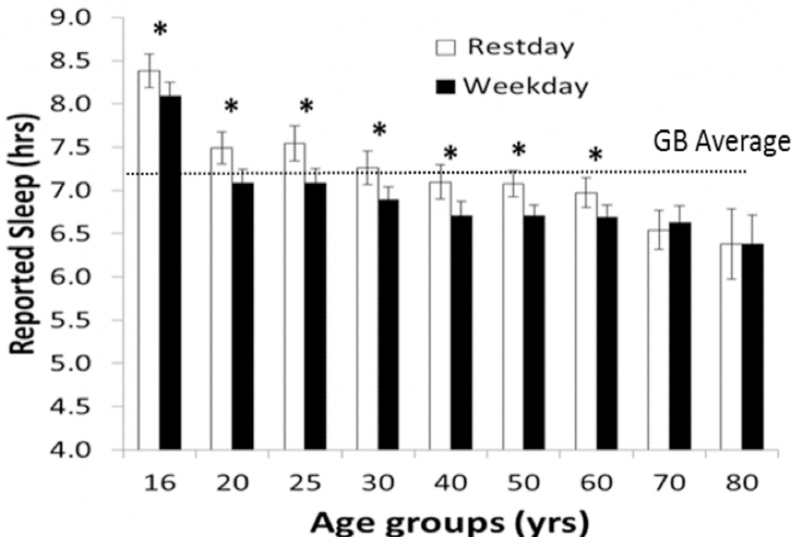Are we sleeping less than we used to? Here are the facts

Many of us might respond to this question with a resounding yes. It is easy to think that we all got better rest in those halcyon days when summers were long and hot, winters were snowy and life was a bit less frenetic. But even if this is true about your own sleep, is it really true of people as a whole?
In UK data that I was involved in collecting around a decade ago, a representative sample of adults by age, sex and geography said they slept for an average of seven hours and three minutes a day. This suggested that over half of the population slept between five hours 30 minutes and eight hours 35 minutes; and about three-quarters slept between five and nine and a half hours per night.
The problem with these general figures, just like the mythical eight hours a night, is that things get more complicated when we ask people how much they sleep on rest or work days, and what age they are. People sleep longer on rest days than on work days by an average of about 20 minutes, and this is true of all age groups until retirement (see figure below). And although the graph does not show it, reported sleep duration also depends on gender. In middle age, for example, women report sleeping longer than men.
Work day and rest day sleep by age group
Comparisons
So are we sleeping less than we did? The graph above suggests this is probably the case on an individual level – by about 20 to 30 minutes per decade. But these data refer to different people at different ages rather than the same people when they were younger and older.
A small number of studies which have used similar methods over time show small increases or small decreases of a few minutes per night over several decades in different countries across the world. But there is absolutely no good evidence that sleep durations are shortening dramatically in the UK or elsewhere.
A fascinating study from last year looked at the sleep patters of tribes-people in Tanzania, Namibia and Bolivia. It measured their actual sleep – as opposed to self-reports – and found they averaged between five hours 40 minutes and seven hours six minutes a night. In other words, many of them seem to be sleeping less than those in the fast-paced 24-7 UK. This again suggests that modern lifestyles are depriving people of less sleep than you might have expected.

Incidentally, another study reported sleep data earlier this year from 8,000 users of an iPhone sleep app around the world. It showed that the average length of a night's sleep was around seven hours 50 minutes.
The UK, Germany, Norway, Spain, the US and Mexico were all very close to this average. Australia, New Zealand, the Netherlands and France reported longer sleep, while Brazil and Japan were below average. Unfortunately, the numbers in age groups in different countries wasn't controlled. The data are therefore unlikely to be representative of the countries concerned or directly comparable with each other, and so need a large pinch of salt.
Catching up
From the information above, it might mean that our intuition is simply wrong about glorious night times past. Or maybe the real question is different: whether we are sleeping less than we need. We know from laboratory studies in which people can have nearly unlimited sleep that they quickly satiate: that is, they reach a point where the amount they sleep stabilises.
This suggests that if we were getting enough sleep on weekdays, we would not sleep more on rest days. For individuals, a large difference in sleep on rest days and work days is a useful indicator of unmet need for sleep. For the UK as a whole, the gap between work and rest days suggests that people maybe are sleeping less than they need – at least those of school or working age.
We don't know much about how this gap has changed over the years, though there are some fascinating data from South Korea taken from regular surveys between 1981 and 2005. Weekday sleep didn't change over the period, though Saturday sleep increased by 13 minutes and Sunday sleep by 24 minutes per night.
I suspect we would see something similar if we looked for the same phenomenon in other countries. What is probably happening is that the rising demands of the working week are increasing the amount of sleep we need. If so, having less time available on weeknights might mean we can only meet this increased need for sleep on the weekend – if at all. Time with family, exercising and other demands on our lives outside work probably allow us all less scope than we would like.
So are we sleeping less? No. But we may be sleeping less well than we need to.
This article was originally published on The Conversation. Read the original article.
![]()

















